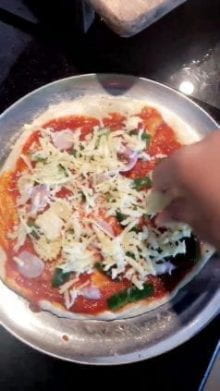As this week has been less overwhelming in terms of workload, I decided to improve my cooking skills. Pizza is a well-known dish around the world. Pizza is also one of my favorite food amongst Indian food. Today, I decided to create pizza… with a twist. As I don’t have an oven, I got creative and created pizza on a stove!
Ingredients:
- Dough (Homemade/Readymade)
- Sauce
- Toppings (Vegetables : Bell Pepper, Onions)
- Salt
Recipe:
- Take dough and roll it into a circle.
- Puff off the edge for the crust to be thicker.
- Put on the pizza sauce and garnish it with preferred toppings.
- Put salt on the stove and then put the pizza in the stove.
- Take it out after 30 mintues and enjoy your stovemade pizza!
Reflection:
What I accomplished after this activity is that I was able to successfully make a delicious pizza. Although it didn’t taste like pizza from “domino’s” or “pizza hut”, it definitely had a unique but exemplary taste. Throughout my process, my mother definitely did help me. She made the dough for me and set up the stove for me which really helped me get a good finished product. This experience helped me gain cooking skills as well as organizational skills because I was able to measure precisely and spread the toppings on the pizza evenly. In addition, I learned to work collaboratively with people but also make a well-cooked dish. This skill would come useful in college when I’m alone with no one to cook for me. This would fall under the “life skills” or “home skills” category. Cooking is considered an essential life skill as food is our main source of energy. Since I’m vegetarian, I was able to make this experience environment-friendly. Having a vegetarian diet is seen to reduce carbon and other greenhouse gas emissions in the atmosphere. “Eating a veggie diet means 2.5 x less carbon emissions than a meat diet.” (vegsoc.org) This further substantiates that my claim is indeed true and that vegetarianism promotes environmental sustainability, more specifically, climate change!
Although my finished product came out well, I did go through some errors throughout my process. For example, I didn’t precisely measure how much cheese would be needed. So, when my finished pizza was produced, I realized that the cheese had melted causing there to be an uneven sauce+toppings and cheese ratio. The taste of the sauce was stronger than the taste of the cheese. So, one thing I’d change is that I’d try to better balance my ingredients so the pizza doesn’t taste weird or off. In overall, I greatly enjoyed this experience and definitely hope to do it again.
Learning outcomes observed:
1. Strength & growth
LO1 Identify own strengths and develop areas for growth Students are able to see themselves as individuals with various abilities and skills, of which some are more developed than others.
2. Challenge and skills
LO2 Demonstrate that challenges have been undertaken, developing new skills in the process
A new challenge may be an unfamiliar experience or an extension of an existing one. The newly
acquired or developed skills may be shown through experiences that the student has not previously
undertaken or through increased expertise in an established area.
3. Initiative & planning
LO3 Demonstrate how to initiate and plan a CAS experience Students can articulate the stages from conceiving an idea to executing a plan for a CAS experience or series of CAS experiences. This may be accomplished in collaboration with other participants. Students may show their knowledge and awareness by building on a previous experience, or by launching a new idea or process.
4. Working collaboratively with others
LO4 Show commitment to and perseverance in CAS experiences Students demonstrate regular involvement and active engagement in CAS.
7. Recognize and consider the ethics of choices and actions
LO7 Recognize and consider the ethics of choices and actions Students show awareness of the consequences of choices and actions in planning and carrying out CAS experiences.
6. Global engagement
LO6 Demonstrate engagement with issues of global significance Students are able to identify and demonstrate their understanding of global issues, make responsible decisions, and take appropriate action in response to the issue either locally, nationally or internationally.



